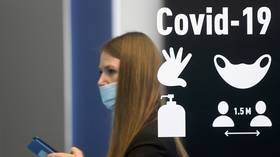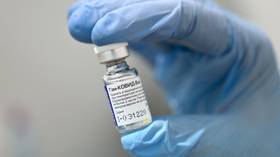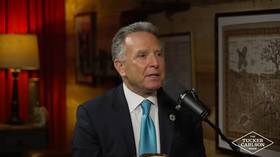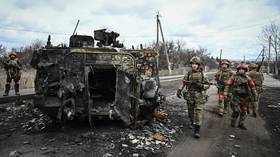Scientists develop drug to treat Covid-19 anxiety

A team of Russian scientists has pioneered a new anti-anxiety drug designed to calm the nerves of worried coronavirus patients and minimize the risk of potentially dangerous interactions with medicines used to treat the virus.
“We’ve developed an innovative new molecule that acts highly selectively on adrenoceptors and serotonin receptors, and provides anxiolytic, anti-depressive, and procognitive effects,” Elena Yakubova, Russia’s National Technological Initiative’s medical director, told RIA Novosti on Friday. “In the second phase of pre-clinical and clinical trials, the medication proved highly effective, tolerable, and safe.”
According to her, those given the new therapy, named Aviandr, saw their scores on anxiety tests fall by more than half after eight weeks of taking the treatment. In addition to reducing anxiety, the medication also demonstrated a noticeable anti-depressive effect.
“We are currently in the third phase of clinical trials for two cases: generalized anxiety disorder and neurological disorders associated with cases of extended coronavirus infection,” the director continued.
Generalized anxiety disorder is a condition characterized by constant, excessive, and unrealistic worry over everyday things. Over 300 million people suffer from it, according to the World Health Organization, and there have been warnings that the pandemic has sparked a global mental health crisis and strained support services. In addition, there are fears recovering coronavirus patients could be at greater risk of developing symptoms.
The National Technological Initiative added that the market for medications to treat the condition is at least $7 billion. Many of the available drugs, however, can result in serious side effects including headaches, weakness, and insomnia. In addition, the boffins said, anti-anxiety medications have been shown to result in dependency, leading to withdrawal after the course of treatment.
Worse still, in July last year, a team of Italian scientists published an analysis that suggested a range of drugs used to treat mental health conditions “showed potentially relevant safety risks for people with Covid-19.” According to the research, those on the medicines “may frequently require treatment with psychotropic medications, but are at the same time at higher risk for safety issues because of the complex underlying medical condition and the potential interaction with medical treatments.”
According to Andrey Ivashchenko, another scientist at the NTI, if the results are confirmed in a third round of clinical trials, “the Ministry of Health can decide to speed up the approval of Aviandr, which will help millions of Russian patients get effective, modern therapy for post-Covid central nervous system disorders,” he said, adding that the medication also has great export potential.















